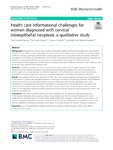Mostrar o rexistro simple do ítem
Health care informational challenges for women diagnosed with cervical intraepithelial neoplasia : a qualitative study
| dc.contributor.author | Freijomil Vázquez, Carla | |
| dc.contributor.author | Gastaldo, Denise | |
| dc.contributor.author | Coronado, Carmen | |
| dc.contributor.author | Movilla Fernández, María Jesús | |
| dc.date.accessioned | 2019-10-09T17:48:30Z | |
| dc.date.available | 2019-10-09T17:48:30Z | |
| dc.date.issued | 2019-09 | |
| dc.identifier.issn | 1472-6874 | |
| dc.identifier.uri | http://hdl.handle.net/2183/24077 | |
| dc.description.abstract | [Abstract] Background: Internationally, women with cervical intraepithelial neoplasia (CIN) lack knowledge about their disease, which limits their ability to take responsibility for self-care and creates negative psychosocial effects, including marital problems. Normally, screening is performed in primary care, and in case of abnormal results, the patient is referred to specialized care for follow-up and treatment. Given the lack of international literature regarding patients’ experiences in primary and specialized healthcare, our study aims to: (a) investigate how women with CIN perceive the communication and management of information by healthcare providers at different moments of their healthcare and (b) identify these women’s informational needs. Methods: A qualitative exploratory study was carried out in a gynecology unit of a public hospital of the Galician Health Care Service (Spain). Participants were selected through purposive sampling. The sample consisted of 21 women aged 21 to 52 years old with a confirmed diagnosis of CIN. Semistructured interviews were recorded and transcribed. A thematic analysis was carried out, including triangulation of researchers for analysis verification. Results: Two analytical themes were identified. The first was communication gaps in the diagnosis and management of information in primary and specialized healthcare. These gaps occurred in the following moments of the healthcare process: (a) cervical cancer screening in primary care, (b) waiting time until referral to specialized care, (c) first consultation in specialized care, and (d) after consultation in specialized care. The second theme was participants’ unmatched informational needs. The doubts and informational needs of women during their healthcare process related to the following subthemes: (a) HPV transmission, (b) HPV infection symptoms and consequences, and (c) CIN treatment and follow-up. Conclusions: This study shows that women who have a diagnosis of CIN experience important healthcare informational challenges when accessing primary and specialized care that have several implications for their wellbeing. The information given is limited, which makes it difficult for women to understand and participate in the decision making regarding the prevention and treatment of CIN. Service coordination among different levels of care and the availability of educational materials at any given time would improve the patients’ healthcare experience. | es_ES |
| dc.description.sponsorship | Xunta de Galicia; ED481A-2016/347 | es_ES |
| dc.language.iso | eng | es_ES |
| dc.publisher | BMC | es_ES |
| dc.relation.uri | https://doi.org/10.1186/s12905-019-0811-5 | es_ES |
| dc.rights | Atribución 3.0 España | es_ES |
| dc.rights | Creative Commons Attribution 4.0 International License | es_ES |
| dc.rights.uri | http://creativecommons.org/licenses/by/3.0/es/ | * |
| dc.subject | Cervical intraepithelial neoplasia | es_ES |
| dc.subject | Papillomavirus infections | es_ES |
| dc.subject | Health education | es_ES |
| dc.subject | Patient care | es_ES |
| dc.subject | Patient satisfaction | es_ES |
| dc.subject | Patient rights | es_ES |
| dc.title | Health care informational challenges for women diagnosed with cervical intraepithelial neoplasia : a qualitative study | es_ES |
| dc.type | info:eu-repo/semantics/article | es_ES |
| dc.rights.access | info:eu-repo/semantics/openAccess | es_ES |
| UDC.journalTitle | BMC Women's Health | es_ES |
| UDC.volume | 19 | es_ES |
Ficheiros no ítem
Este ítem aparece na(s) seguinte(s) colección(s)
-
GI- GRINCAR - Artigos [226]






